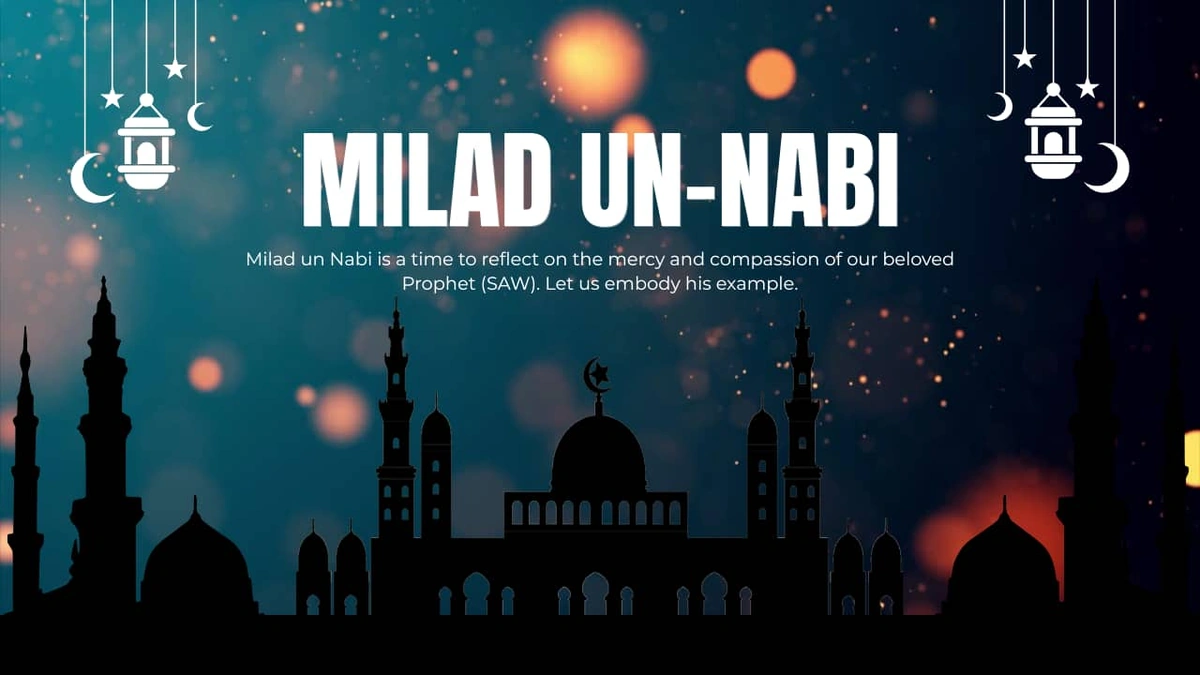Milad-un-Nabi | More Than Just a Date – Understanding Its Profound Significance
Okay, let’s be honest, Milad-un-Nabi isn’t just another date on the Islamic calendar. It’s so much more. It’s a moment steeped in history, tradition, and, most importantly, a deep connection to the Prophet Muhammad (peace be upon him). But what is it about this day that makes it so significant for Muslims around the world, especially here in India, where we celebrate it with such fervor? And why should anyone – regardless of their faith – take notice?
We’re not just talking about a birthday celebration. We’re diving into the heart of Islamic culture, understanding the values it represents, and seeing how it impacts millions of lives. Forget the surface-level explanations. We’re going deep.
The Essence of Milad | A Celebration of Character

Milad-un-Nabi, also known as Mawlid, marks the birth anniversary of Prophet Muhammad. But here’s the thing: it’s not just about remembering the day he was born. It’s about reflecting on his life, his teachings, and the incredible example he set for humanity. It’s about celebrating his character – his compassion, his wisdom, his unwavering commitment to justice.
Think of it this way: it’s like celebrating Mahatma Gandhi’s birthday. We don’t just remember the date; we reflect on his principles of non-violence, his dedication to social reform, and his impact on the world. Similarly, Milad is a time for Muslims to reaffirm their commitment to the Prophet’s teachings and strive to emulate his character in their daily lives.
The spirit of giving and helping the poor is central to the teachings of Islam. This is exemplified during Milad-un-Nabi through acts of charity and community service, making it not just a celebration, but also a way to actively embody the Prophet’s teachings.
Why Milad Matters, Especially in India
India, with its rich tapestry of cultures and religions, has a unique way of celebrating Milad. Mosques and homes are decorated with vibrant lights; processions fill the streets, and stories of the Prophet’s life are shared through songs and speeches. But beyond the festivities, Milad-un-Nabi holds a special significance in the Indian context.
In a country as diverse as ours, the Prophet’s message of peace, tolerance, and social justice resonates deeply. Milad becomes an opportunity to promote interfaith harmony, strengthen community bonds, and reaffirm our commitment to building a more inclusive and equitable society. It’s a reminder that, despite our differences, we are all part of the same human family.
And, frankly, in today’s world – with all its divisions and conflicts – that message is more important than ever. The celebration promotes peace, love, and unity among people of all backgrounds, reflecting the universal message of Islam. The teachings of the Prophet Muhammad offer a pathway to a harmonious society.
It’s worth noting that Indian Muslims observe the day by organizing seerat gatherings, where stories of the Prophet’s life are narrated. The recitation of Naat , poetry in praise of the Prophet, further enriches the spiritual atmosphere.
How to Embrace the Spirit of Milad in Your Own Life
So, how can you, as an individual, embrace the spirit of Milad-un-Nabi, regardless of your background? It’s simpler than you might think. Start by learning more about the Prophet’s life and teachings. Read a biography, watch a documentary, or listen to a lecture by a knowledgeable scholar. There are tons of resources available online . Then, reflect on how you can incorporate his values into your own life. Can you be more compassionate, more forgiving, more dedicated to helping those in need?
Remember, it’s not just about attending religious ceremonies or participating in processions. It’s about embodying the spirit of Milad in your everyday actions. It’s about treating others with kindness, speaking out against injustice, and striving to make the world a better place, one small step at a time.
Moreover, engage in charitable activities or community service. This could include donating to the needy, volunteering at a local organization, or simply offering a helping hand to someone in need. These are all ways to actively embody the Prophet’s teachings and make a tangible difference in the lives of others.
And consider supporting causes that promote education, healthcare, and economic development in underprivileged communities. This reflects the Prophet’s emphasis on social justice and equality.
The Modern Relevance of Milad-un-Nabi
Let’s be real: some might see Milad as an ancient tradition with little relevance to today’s world. But that couldn’t be further from the truth. In a world grappling with issues like inequality, intolerance, and violence, the Prophet’s message of peace, justice, and compassion is more vital than ever. The teachings of compassion and equality, central to Milad-un-Nabi, provide a framework for addressing social issues and promoting understanding. August Independence Day.
Milad-un-Nabi serves as a reminder that we all have a responsibility to contribute to the well-being of humanity. It’s a call to action – an invitation to build bridges, foster understanding, and create a more just and peaceful world for all. It provides a timeless model for ethical behavior and social responsibility. And the significance is particularly relevant in modern multicultural societies.
The Role of Sufi Traditions in Milad Celebrations
Sufism, the mystical dimension of Islam, plays a significant role in how Milad-un-Nabi is celebrated, particularly in India. Sufi traditions emphasize love, devotion, and spiritual connection with the divine. During Milad, Sufi gatherings, known as mehfils , are organized, featuring devotional music ( qawwali ) and poetry that express love for the Prophet.
These gatherings provide a space for spiritual reflection and communal celebration. The Sufi perspective adds a layer of depth to the celebration, highlighting the importance of inner transformation and spiritual growth. They add a unique dimension to the celebrations. Happy Independence Day
The celebrations are also marked by the distribution of sweets and food, reflecting the Prophet’s generosity. The act of sharing embodies the spirit of compassion and unity.
FAQ About Milad-un-Nabi
What exactly is Milad-un-Nabi?
It’s the celebration of the Prophet Muhammad’s birthday, a time for reflection, remembrance, and reaffirming commitment to his teachings.
When is Milad-un-Nabi celebrated?
It falls on the 12th day of Rabi’ al-awwal, the third month in the Islamic calendar. Note that the Islamic calendar is lunar, so the Gregorian date varies each year.
How do Muslims celebrate Milad-un-Nabi?
Through prayers, processions, lectures, charity, and community gatherings – all focused on remembering and honoring the Prophet’s life.
Is celebrating Milad-un-Nabi a mandatory practice in Islam?
No, it is not obligatory. However, it is a widely observed and cherished tradition by many Muslims around the world.
What is the significance of Naat Sharif during Milad?
Naat Sharif is devotional poetry praising the Prophet Muhammad, and its recitation adds a spiritual and emotional dimension to the Milad celebrations.
What are the key messages promoted during Milad-un-Nabi celebrations?
Peace, compassion, justice, tolerance, and the importance of emulating the Prophet’s character in daily life.
Ultimately, Milad-un-Nabi is a powerful reminder that the values of compassion, justice, and peace are not just ideals to aspire to, but principles that can guide us in creating a better world for all.













